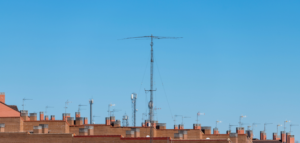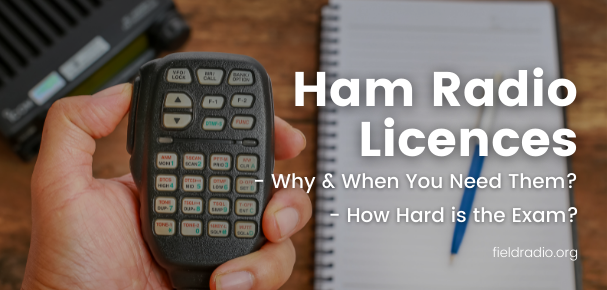This article is all about how you can use Ham Radio without having a license. Moreover, it will explain when you need to get an amateur radio license and the benefits of having one.
Before that, let us know what ham radio is?
Ham or Amateur Radio is an expert system for personal or group correspondence utilizing versatile digital signals on shortwave, longwave, and high-frequency bands. Amateur radios are used for non-commercial exchange messages by individuals either by morse code or by phone (voice).The word “ham” refers to amateurs who used to identify themselves as “Hams” during their early days of broadcasting.
What Are The Benefits Of Using Ham Radio
The benefits of using ham radio are that you can use it when there is no power in your country to send messages over the land. Moreover, amateurs can contact each other and form a temporary network for communications within their local area without any infrastructure like phone lines and internet cables.
It can be used as backups of these services during an emergency or natural disaster. That’s why amateurs worldwide have made it a duty to remain ready at all times so that they can help people who need it when such situations arise.
How To Listen To Ham Radio Without A License
Can you listen to ham radio without a license? Many people don’t know that there are certain situations in which you can use ham radio without a license. There are certain restrictions, but nobody will arrest you if they catch you listening to the ham radio without a call sign.
The only time it becomes illegal is when you transmit on ham frequencies without an FCC-issued license or permit. The process of listening to ham radio is straightforward if you know how to do it. These days many people have gone digital, and using ham radios is one of them.
Incase you don’t know how to use a Ham Radio, here’s how and where you can get started without legal problems:
- Tune your FM band receiver between 88 and 108 MHz and pick out one of the strongest signals as close as possible to 100 MHz as your local repeater output frequency (dial position). If there’s no repeater within range, you’ll pick up voice conversations from other hams.
- Tune your receiver between 28 and 29 MHz to pick up long-range 5-MHz hams or look into the 10-meter ham band at 24.89 MHz.
- Or tune into shortwave broadcast bands by adjusting your dial to approximately 7 to 8 MHZ, where you can eavesdrop on hams using these frequencies. The General class license gives you access to all HF amateur radio bands, including 160 meters (1.8 MHz). You gain four additional high-frequency bands for ham radio by obtaining your Technician Plus license!
- Look for utility stations working other hams on 2 meters repeaters near 147. 300+ Repeaters are linked nationwide, allowing mobiles & base station operators with simplex capability across the USA.
- Tune your receiver between 29 and 450 MHz to listen close in for activity on the VHF/UHF bands, including repeaters, packet radio, two-way mobile, government operations, and more. Many of these frequencies are open to hams with Technician class or higher licenses.
- You can also tune into satellites 2,300 miles above the earth at 145.8 MHZ which are used by ham radio operators worldwide using handheld transceivers. You don’t need a license for this!
- Finally, you can always find active ham radio operators across North America simply by tuning your receiver between 144 and 148 MHz, where all activity is within range of any FM radios sold in the United States and Canada. Five watts of power will get you heard on repeaters and handheld radios which is plenty for emergency or weather-related transmissions!
What You Need To Set Up Your Own System
The first thing you need to do is go out and buy the equipment required for this purpose. Start by getting the best antenna possible so that it covers more area than usual. Moreover, try to find out which direction your nearest amateur radio station is located so that you can listen in on their channels too.

After buying your antenna, get yourself a good-quality receiver with multiple bands (AM/FM VHF UHF). It shouldn’t cost you more than $1,000, and it will cover all the bands required for communication.
Lastly, make sure that your equipment has a “VOX” (voice-operated switch) system included, which allows hands-free communication without any interference from external noise.
By following these instructions, we guarantee you that anyone can listen to ham radio without having an
amateur license as long as they follow every step carefully.
Keep in mind that there is always risk involved when listening to Ham Radio like other signals because this type of communication is only supposed to be used by licensed users after passing their examinations and getting their permission to do so.
Things To Look Out For To Prevent Doing Something Illegal
Hams should look out for these things before listening to ham radio because they are the ones who will be held responsible for breaking the law if caught. It would be best to keep in mind that you can listen to ham radio, but you cannot transmit any signals without the administrations’ permission.
Now, this is not saying that you cannot discuss politics or other matters on air, but what we mean by “transmitting” here is sending messages or codes that could interfere with another amateur’s transmissions which would then cause a disturbance in their signal.
So, it is strictly advised for anyone interested in getting involved in Ham Radio to check up on how it works under official authorities first to find out where they stand legally and avoid harming others with your action.
What Things You Shouldn’t Do On Ham Radio
There are many things that you should avoid doing on ham radio because it could lead to negative consequences. Firstly, never use illegal frequencies reserved for other purposes, and secondly, don’t transmit anything unless authorized by the government first. Last but not least, make sure that you check if your equipment is legal before using it as well.
If you break any of these rules, then it would be very risky for you! Some people think that they will never get caught if they do something wrong on-air but rest assured, some frequencies work day and night worldwide explicitly designed to capture these kinds of activities 100% of the time, so you should keep yourself safe!
What Things You Can Do To Get Involved
Now that you know how to use ham radio without a license, what are your options? You can either listen or transmit. Listening is much easier than transmitting since you won’t need any special training for this purpose, and it could be done anywhere at any time as long as you have the equipment with you.
However, there might come a situation when someone has an emergency and wants help immediately. For this kind of situation, you should get involved in communication by getting your license and your equipment because communicating during these times could save lives!
Plus, once you become an amateur radio operator, you can use the repeater systems for your convenience.
How Can You Get A Ham Radio License
Once you have all the equipment, decide if you want to listen or communicate on-air and get an amateur radio license. Remember that getting your license will give you better access to frequencies, so apply for it as soon as possible!
The only way to do so is through a written exam with three levels (Technician, General, and Extra).
All you need for level 1 (Technician) is a short 35 questions test with 26 correct answers. On the other hand, General License requires you to answer 50 questions correctly from a total of 100 features, while Extra License needs at least 75/100 categories checked out. So prepare yourself and good luck!

I have been passionate about the world of communications in its various forms for most of my life. Ever since I first found an old ham radio stashed away in my uncle’s attic, I have had a fascination with this classic technology.
Having the ability to communicate with people without the need to rely on telephone lines or networks is an empowering feeling which I believe everyone should have at least a basic knowledge of. Becuase who knows when you might need it?
I setup fieldradio.org with this passion in mind, to help inform people about the amazing possibilities of amateur radio and I’m on a quest to help educate as many budding operators as possible.
I hope you enjoy our content. Come and say hi, via our contact form


